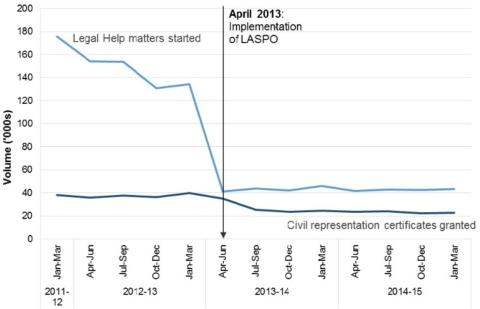You are here
Legal aid cuts prevent the police from being held accountable for their actions

Ministry of Justice statistics show the effect of cuts to legal aid. Ministry of Justice
Who holds the police to account for their actions? Is it just institutions, such as the Independent Police Complaints Commission, the elected police and crime commissioners, and the forces’ disciplinary procedures? Something that’s often forgotten is the essential role played by lawyers as they try to obtain justice for the individuals who have been wronged by the police.
From those falsely imprisoned or families whose loved ones have died in custody to those who have been spied upon or had evidence fabricated for use against them, there are many that seek redress. Many don’t even seek compensation, just an admission of wrongdoing from the police and an apology. But getting to that point through the courts is an expensive business. Notwithstanding its obvious importance to the individuals involved and society at large, getting justice in cases where the police are at fault is something that successive governments have made harder.
As part of his response to home secretary Theresa May’s statement to the House of Commons on the Hillsborough Inquests, Labour shadow Andy Burnham stated:
At many inquests today there is often a mismatch between the legal representation of public bodies and those of the bereaved. Why should the authorities be able to spend public money like water to protect themselves when families have no such help? So will the government consider further reforms to the coronial system, including giving the bereaved at least equal legal funding as public bodies?
Burnham is exactly right. To walk into court with one junior lawyer, paid either at legal aid rates, or on a no-win-no-fee basis, or simply acting pro bono, only to find the agents of the state represented by top barristers is a galling experience. The recent Hillsborough Inquests are unusual in this respect as they were properly state funded, but the families of the 96 fans that died had this precise experience during the original inquests in 1990.
The experience of others at far shorter, less complex inquests is often similarly difficult. Trying to meet the exacting means-test and seriousness requirements of the Legal Aid Agency (LAA) leads to delay and distress. But the government has an obligation to allow families whose loved ones may have died at the hands of the state to be involved in the investigation into what went wrong.
This struggle to acquire funding so as to be able to hold the police to account is not restricted to coroner’s inquests. Elsewhere in civil proceedings or judicial reviews of police decisions, the struggle for funding is the same. The Legal Aid Sentencing and Punishment of Offenders Act 2012 (Laspo) reduced the scope of what type of case can attract legal aid. If the claim does qualify, the potential claimant must meet strict criteria to be funded. LAA guidance on funding in police actions requires that there be at least a 50% chance of success.
By contrast, senior lawyers representing the government report that they have experience of being instructed “to defend government decisions despite advising that the prospects of doing so are considerably below 50%”. There is a clear double standard here, with no rules to prevent the state from squandering public money to defend its own decisions or actions.
Mounting a legal challenge by way of civil action or judicial review is expensive. Defending them is also expensive – almost certainly more expensive than running a human rights compliant constabulary in the first place. If a victim of police misconduct loses their case, they become liable for the constabulary’s legal costs. If you only stand to win a small amount – actions against the police win on average? below £20,000, often much less – many will take the attitude that it’s not worth risking their home to prove in court that they were wronged. Previously, it was possible to obtain so-called “after the event insurance” to support your claim, but this is now all but impossible.
This leaves many potential claimants without a viable mechanism to fund a claim against the police. The Police Action Lawyers Group, an affiliation of lawyers who represent individuals acting against the police, stated in their recent submission to the Fabian Society’s Bach Commission on Access to Justice:
As a result of reforms which made after the event insurance premiums irrecoverable from defendants, for most of those clients [who are ineligible for legal aid due to Laspo] there is currently no viable funding model.
The police will therefore go untroubled by claims in the civil courts.
In the past, criminal barristers have gone so far as to stage walk-outs against legal aid cuts, but this is not a campaigning strategy available to those acting against the police. If they were to walk out the police can happily continue its misconduct safe in the knowledge that nobody would issue claims against them nor represent families who wish to ask difficult questions at inquests.
And ultimately that would suit the police just fine. Cuts in legal aid are not really about tackling the public spending deficit, they are a key mechanism in reducing the possibility to hold the police and state to account.
This article was originally published on The Conversation. Read the original article.
James Mehigan, Lecturer in Criminology, The Open University
